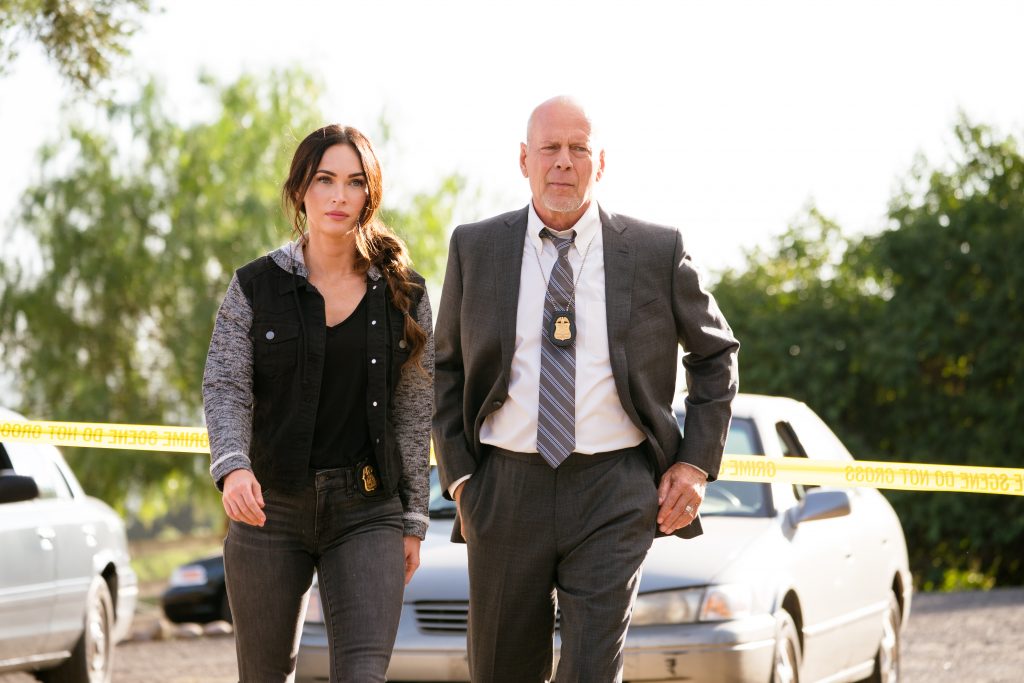August 31, 2021
by Carla Hay

Directed by Randall Emmett
Culture Representation: Taking place in Florida, the dramatic film “Midnight in the Switchgrass” features a predominantly white cast of characters (with a few African Americans and Latinos) representing the working-class and middle-class.
Culture Clash: Law enforcement officials try to capture an elusive serial killer who targets prostitutes for murder.
Culture Audience: “Midnight in the Switchgrass” will appeal primarily to people who don’t mind watching boring, formulaic and predictable crime dramas.

It’s quite a stretch to call “Midnight in the Switchgrass” an “original movie,” since this formulaic dud recycles every movie/TV cliché about cops looking for a serial killer who targets prostitutes. If you’ve seen any movie with the same concept, then you know exactly what to expect in “Midnight in the Switchgrass.” A derivative film might be mildly acceptable if there was some excitement in the story or if the characters had charisma.
But the filmmakers of “Midnight in the Switchgrass” made no attempt at having anything in the movie that that could be described as “suspenseful” or “surprising.” And the cast members look like they’re just going through the motions. There are zombies that have better personalities than almost all of the characters in this dull and dreary crime drama.
Directed by Randall Emmett and written by Alan Horsnail, “Midnight in the Switchgrass” doesn’t even have a clever title. The movie’s title refers to a switchgrass field in Florida where the killer keeps some of his victims captive in a hidden storm tunnel. Switchgrass is also mentioned as a place where one of the serial killer’s murder victims used to hide as a child to escape from an abusive father. The movie takes place mostly in Florida’s Pensacola area, where two cops from the Florida Department of Law Enforcement are on the hunt for the serial killer. (This movie was actually filmed in Los Angeles and Puerto Rico.)
“Midnight in the Switchgrass” has probably gotten more publicity for being the movie set where co-stars Megan Fox and Colson Baker (also known as musician Machine Gun Kelly) fell in love. Fox separated from her actor husband Brian Austin Green after finishing the movie. She and Baker went public with their romance after that. It’s probably the only thing that people will remember about this dreadful movie.
Fox and Baker have just one very short scene together in “Midnight in the Switchgrass,” near the beginning of the film. She portrays an undercover cop named Rebecca Lombardi, who usually goes undercover as a prostitute. (How stereotypical.) Baker plays a sleazy pimp named Calvin “Calxco” Colton, who’s got Rebecca in a motel room, and he wants her to do some prostitution work for him, but she’s stalling.
The sting almost goes awry when Calxco starts to get rough with Rebecca, and it seems as if he won’t let her leave the motel room. She fights back in ways that show she’s not a typical hooker but someone who’s got combat skills. Luckily, Rebecca was able to alert her police colleagues through audio surveillance, and the cops arrive in time to arrest Calxco.
One of the colleagues who worked with her on this sting is Byron Crawford (played by Emile Hirsch), an earnest cop with a very fake-sounding Southern accent, thanks to Hirsch’s terrible acting in the movie. Byron ends up taking the lead on the investigation of the prostitute murders that are plaguing the area. Byron and Rebecca want Claxco to give information about who’s been murdering prostitutes and dumping their bodies along the highway. Claxco gives a clue about what the suspected killer’s truck looks like, and then Claxco isn’t seen in the movie again.
Ultimately, it doesn’t matter, because the investigation of this prostitute-murdering serial killer uses the same formula as other similar movies and TV shows. The obligatory grizzled and jaded cop veteran is FBI agent Karl Helter (played by Bruce Willis), who’s only in about 25% of the movie. Translation: “Midnight in the Switchgrass” didn’t have the budget to hire Willis in a role where he would get most of the screen time. Willis looks like he’s just there for the easy salary, and he looks completely “checked out” emotionally in this movie.
The only important thing that Karl tells the Florida cops is that the federal government doesn’t want to get involved in finding this serial killer. And so, Byron and Rebecca do most of the legwork to solve the case. And you know what that means: Rebecca is going undercover as a hooker again, so that she can be bait for the serial killer. You can almost do a countdown to when she gets held captive by the serial killer. (And it would be easy to predict, even if it wasn’t shown in the movie’s trailer.)
Through surveillance footage, the cops find out that the serial killer is most likely a truck driver, because many of the murder victims were last seen at or near a truck stop. There’s even surveillance video of one the of murder victims being forced to leave with him. And sure enough, the killer really is a truck driver. The movie’s trailer shows his face, so it’s not spoiler information to reveal that the killer is a married father named Peter (played by Lukas Haas), who’s been leading a double life.
Predictably, Peter has a “Jekyll & Hyde” personality: He’s mild-mannered and quiet to most people, but he’s a rage-filled monster when he’s alone with his victims. He doesn’t kill all of his victims right away, but he keeps them tied up in the storm tunnel to torture and sexually assault them. Peter also has a barn with a locked door to hide a lot of evidence related to his murders. Because the movie reveals early on who the serial killer is, there’s no mystery or suspense. The screenplay for “Midnight in the Switchgrass” is so lazy and generic, there’s not even an explanation for why Peter turned out the way that he did.
It must be frustrating for aspiring filmmakers who have truly original ideas for movies but can’t get the financing for these movies to be made, while unimaginative junk like “Midnight in the Switchgrass” is churned out, just because some actors with well-known names signed on to the project. You can almost hear the thought process of the “Midnight in the Switchgrass” producers: “Sure, there’s already a lot of movies and TV shows about cops looking for a serial killer, but this movie doesn’t have to be good, as long as we might make a profit from it.”
“Midnight in the Switchgrass” is the type of sexist movie where almost all of the adult female characters have shallow, underdeveloped roles as prostitute crime victims or dutiful wives/mothers at home. Peter has a wife named Karen (played by Lydia Hull) and a daughter named Bethany (played by Olive Elise Abercrombie), who’s about 7 or 8 years old. Peter’s wife and daughter have no idea that he has this secret life as a serial killer. Byron has a baby daughter named Bella with his wife Suzanna (played by Jackie Cruz), who does nothing in this movie but fret over her husband
And the movie doesn’t really care to give the prostitute victims any real personalities. They have names like Heather (played by Sistine Rose Stallone), Chastity (played by Katalina Viteri), Tracey (played by Caitlin Carmichael) and Sarah, who has no dialogue in the movie because she’s already dead. Peter’s victims are typically all young and pretty.
In one unrealistic scene, one of the prostitutes invites Peter into her motel room before they even discuss the price of her services. You don’t have to be a sex worker to know that’s just not the way they do business. A sex worker wouldn’t invite a potential customer to a room until the sex worker knows first how much the customer is going to pay.
As for undercover cop Rebecca, she’s one of the few women in the movie who isn’t a prostitute or a dutiful wife/mother. However, she still spends about half of her screen time pretending to be a hooker. It’s just an excuse to have Fox in a movie where she has to dress like a prostitute and spend a considerable amount of screen time being tied up in the scenes where she’s been kidnapped.
There’s a half-hearted attempt to make Rebecca a little feisty, but the dialogue is so bland for all of the characters, viewers who have the misfortune of sitting through this dreck will have a hard time remembering any specific lines of conversations after the movie is over. If you make it to the end without falling asleep, you’ll find that “Midnight in the Switchgrass” fails to live up to its description as a “thriller,” since there is almost nothing in this horrific misfire that is thrilling.
Lionsgate released “Midnight in the Switchgrass” in select U.S. cinemas, on digital and VOD on July 23, 2021, and on Blu-ray and DVD on July 27, 2021.


